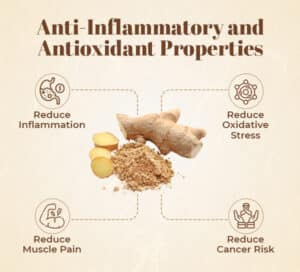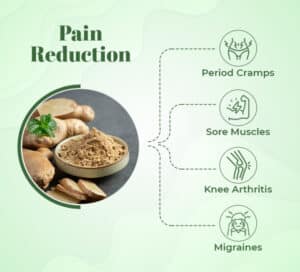Ginger (Zingiber officinale) is a widely used spice and medicinal herb with a history stretching back thousands of years. Prized in both traditional and modern medicine, ginger’s unique bioactive compounds-primarily gingerols, shogaols, and paradols-are credited with a range of health-promoting effects.
Health Benefits of Ginger
1. Anti-Inflammatory and Antioxidant Properties

Ginger is rich in gingerol, shogaol, and paradol-compounds with potent anti-inflammatory and antioxidant effects. These substances help neutralize free radicals, reduce oxidative stress, and modulate the immune response.
Published in the International Journal of Preventive Medicine (April 2013), this review highlights ginger’s antioxidant and anti-inflammatory potential. Bioactive compounds like gingerols and shogaols may help reduce inflammation, oxidative stress, muscle pain, and cancer risk. While promising, further clinical research is needed to confirm ginger’s therapeutic efficacy in humans.
2. Relief from Nausea and Digestive Discomfort

One of ginger’s most well-established uses is for alleviating nausea.
Published in Integrative Medicine Insights (2016), this review highlights ginger’s effectiveness in preventing nausea and vomiting during pregnancy and chemotherapy. Active compounds like gingerols and shogaols act on serotonin and cholinergic receptors. Multiple clinical trials, including a large multicenter trial with 576 cancer patients, found 0.5–1 g/day of standardized ginger reduced acute chemotherapy-induced nausea. As per this review article, ginger was also effective and safe in pregnancy-related nausea.
3. Pain Reduction

Ginger’s anti-inflammatory effects extend to pain relief.
Published in Phytotherapy Research (2020), this review of clinical trials shows that ginger may help reduce pain in conditions like period cramps, sore muscles, knee arthritis, and migraines. Most studies used 750 mg to 2 g daily. Ginger worked as well as painkillers in many trials, with few side effects.
4. Cardiovascular and Metabolic Health

Ginger may contribute to heart health by lowering cholesterol levels, reducing blood pressure, and improving blood flow.
A 2022 review in the Iranian Journal of Basic Medical Sciences highlights ginger’s potential in managing metabolic syndrome. Clinical trials show that ginger (up to 3 g/day) may reduce fasting blood sugar, HbA1c, and insulin resistance. Its active compounds also exhibit antioxidant, hypolipidemic, anti-obesity, and antihypertensive effects.
5. Support for Immune Function

Ginger may exhibit antibacterial, antiviral, and antifungal activity.
A 2017 pilot study by Danwilai et al. explored the immune-enhancing potential of ginger in cancer patients undergoing chemotherapy. Participants received 20 mg of 6-gingerol daily, resulting in improved activity of antioxidant enzymes such as SOD, CAT, and GPx, along with reduced levels of oxidative stress markers like MDA and NOx. These findings suggest ginger’s role in supporting immune function by combating inflammation and oxidative stress.
6. Potential Role in Cancer Prevention

Preliminary studies suggest that ginger’s antioxidant and anti-inflammatory compounds may help protect against certain cancers, including colorectal, ovarian, and liver cancers, by inhibiting the growth of cancer cells and protecting DNA from damage.
In the study titled “Cancer Preventive Properties of Ginger” (Shukla & Singh, 2007, Food and Chemical Toxicology), researchers reviewed evidence showing that compounds in ginger—such as 6-gingerol, 6-paradol, shogaol, and zingerone—possess strong antioxidant and anti-inflammatory properties. These bioactives may suppress free radicals, modulate immune responses, and induce apoptosis in cancer cells, suggesting ginger’s promising role in immunity enhancement and disease prevention.
7. Weight Management

Emerging evidence indicates ginger may aid weight loss by increasing satiety, enhancing fat metabolism, and reducing inflammation associated with obesity.
In the 2024 meta-analysis titled “Ginger intervention on body weight and body composition in adults”, researchers analyzed 27 randomized controlled trials involving 1309 participants. The study found that daily ginger intake (especially 2g per day for more than 8 weeks) significantly reduced body weight, BMI, waist circumference, and body fat. Since excess weight impairs immune response, ginger’s role in improving body composition may indirectly support better immune function.
Dietary Tips for Consuming Ginger
Recommended Dosage
Ginger is rich in antioxidants but contains minimal calories, vitamins, or minerals. According to the U.S. Department of Agriculture, 2 teaspoons of ginger offer just 4 calories and negligible nutritional content. Most studies examining ginger’s effects have used doses ranging from 250 mg to 1 gram, taken up to four times a day.
The FDA deems ginger root generally safe, with a recommended maximum daily intake of 4 grams.
Forms of Ginger
- Fresh Root: Peel and grate or slice for use in teas, stir-fries, soups, and smoothies.
- Powdered Ginger: Ideal for baking, curries, and spice blends.
- Candied or Crystallized Ginger: Useful for nausea relief but higher in sugar.
- Ginger Tea: Steep fresh or powdered ginger in hot water for a soothing beverage.
- Capsules/Tablets: Convenient for standardized dosing, but choose reputable brands.
How to Incorporate Ginger into Your Diet
- Add fresh ginger to smoothies, juices, or salad dressings.
- Brew ginger tea by steeping slices in hot water, optionally with lemon and honey.
- Use grated ginger in marinades, stir-fries, soups, and curries.
- Sprinkle powdered ginger into oatmeal, yogurt, or baked goods.
- Try ginger-infused water or combine ginger with lemon or apple cider vinegar for added benefits.
- Supplements: Use caution with supplements, as they may contain higher concentrations than dietary ginger. Always consult a healthcare professional before starting supplements, especially during pregnancy, breastfeeding, or if you have underlying health conditions or take medication.
Precautions and Side Effects
- Gastrointestinal Issues: High doses (>6 grams/day) may cause heartburn, diarrhea, or stomach upset.
- Medication Interactions: Ginger may interact with blood thinners, diabetes medications, and blood pressure drugs. Consult your doctor if you take these medications.
- Allergies: Rare, but possible. Discontinue use if you experience a rash, itching, or swelling.
Ginger is a versatile and powerful natural remedy with a broad spectrum of scientifically supported health benefits, from easing nausea and pain to supporting cardiovascular, metabolic, and immune health. Its anti-inflammatory and antioxidant properties make it a valuable addition to a healthy diet. While generally safe for most people, moderation is key, and those with specific medical conditions or who are pregnant should consult their healthcare provider before increasing ginger intake. Incorporate ginger in fresh, powdered, or tea form to enjoy its flavor and health-promoting effects as part of a balanced diet.
Disclaimer: The Statement has not been evaluated by the EFSA, KFDA or FDA. This product is not intended to diagnose, treat, cure, or prevent any disease. While the information provided is based on credible references, we do not make any specific claims or guarantees. It is important to consult with your healthcare advisor for personalized advice and guidance related to your health.
References:
- Anti-Oxidative and Anti-Inflammatory Effects of Ginger in Health and Physical Activity: Review of Current Evidence
- The Effectiveness of Ginger in the Prevention of Nausea and Vomiting during Pregnancy and Chemotherapy
- Clinical trials on pain lowering effect of ginger: A narrative review
- The effects of ginger and its constituents in the prevention of metabolic syndrome: A review
- A critical review of Ginger’s (Zingiber officinale) antioxidant, anti-inflammatory, and immunomodulatory activities
- Cancer preventive properties of ginger: A brief review
- Ginger intervention on body weight and body composition in adults: a GRADE-assessed systematic review and dose-response meta-analysis of 27 randomized controlled trials
- Ginger as an anticolorectal cancer spice: A systematic review of in vitro to clinical evidence
- Ginger: Uses, benefits, and nutrition




